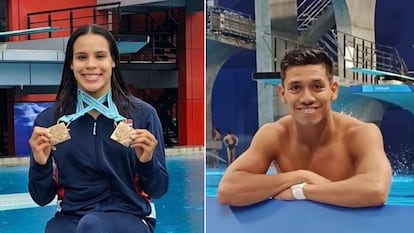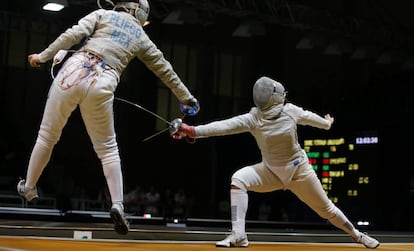The Mexican divers who will compete for the Dominican Republic at Paris 2024 due to lack of support
Problems with the Mexican Swimming Federation and other sports institutions lead athletes to seek alternative nationalities to fulfill their dreams

Victoria Garza, 21, studies at the Universidad Autónoma de Nuevo León (UANL) and is one of the best divers in Mexico, but in 2021 she began the process to become a naturalized citizen of the Dominican Republic, a country that offered her the necessary support to participate in international competitions such as the Olympic Games. She, along with Jonathan Ruvalcaba, 33, are Mexicans who, due to the lack of opportunities and issues with the Mexican sports institutions, will represent the Caribbean country during the Paris 2024 Games.
A sport with parallel stories
Garza won the overall national silver medal, which ensured her participation at the Junior Pan American Games in Cali, Colombia, in 2021, but the now extinct Mexican Swimming Federation (FMN) denied her the resources to go, given that only the expenses for the athlete who finished first would be covered. There was not enough money for her to continue her professional development, in which international competitions are key to improving performance, so she decided to accept an offer from the Dominican Republic, which had no female divers and was searching for talent beyond the island.
Ruvalcaba considered retirement when his name was not among those selected to represent Mexico at the Rio 2016 Olympic Games, but instead began the process to become a naturalized Dominican, who he represented at Tokyo 2020. Ruvalcaba is confident in the talent that exists in Mexico, but his problems with the FMN led to him being barred from competing at international level and forced him to switch allegiance. Paris 2024 will be the second time that the diver has competed under the Dominican flag at an Olympics.
Another Mexican who will compete in Paris under a new nationality is Gabriela Schloesser-Bayardo, 30, who represented Mexico in the archery team at Rio 2016. Despite having no issues with her federation like the other athletes, Bayardo became a Dutch national after marrying her husband, Mike Schloesser, and at Tokyo 2020 she won a silver medal for the Netherlands, sharing the podium with Mexicans Luis Álvarez and Alejandra Valencia, who won bronze.

The sports crisis in Mexico
Complaints in Mexico about the lack of support for athletes are not new, but in recent years the crisis has deepened due to the National Sports Commission (Conade), presided by Ana Gabriela Guevara, being steeped in controversy due to the lack of financing for various disciplines and for the cancellation of scholarships and resources.
One example is the Mexican artistic swimming team, which will compete at the Olympic Games in Paris after an absence of 28 years. Earlier this year the team won gold at the world championship in Egypt, but to get that far it had to sell towels and seek support from companies such as Telmex, which helped it get to the competition. Another equally important victory is the lawsuit it won against Conade. The commission had to pay part of the money owed to the team members, but other swimmers are still without a cent even after winning lawsuits against the institution.
One of the most talked-about cases against Conade and the Mexican Olympic Committee (COM) is that of fencer Paola Pliego, who is now competing for Uzbekistan. She was selected for the 2016 Rio games, but according to a Conade analysis, Pliego tested positive for modafinil, a substance used to treat excessive sleepiness that is banned for use in sport. The fencer denied the accusations, saying that due to her asthma the substance would have caused serious illness or even death.
A test carried out by the International Fencing Federation in Germany returned a negative result, but Pliego had already missed out on the opportunity to compete with Mexico in Rio. In 2018 she sued Conade, the Mexican Olympic Committee, and the Mexican Fencing Federation (FME) for negligence and moral damages. A year later she announced that she would no longer represent Mexico, but Uzbekistan. After years of legal battles, in 2024 Conade agreed to pay 15 million pesos (around $815,000) to the athlete for moral damages.
A familiar story
The flight of talent in Mexican sports is not a recent phenomenon. The first Mexican Olympic athlete to change his nationality also did so due to a lack of support from the Mexican Swimming Federation. Armando Fernández represented Mexico in water polo at Munich 1972 and Montreal 1976, but for the Los Angeles 1984 games he did so with the West German delegation, with which he won a bronze medal. With that team, Fernández also won a water polo world championship and a fourth place at Seoul 1988.
In more recent years, diver Kevin Chávez won the bronze medal for Mexico at the 2013 World Swimming Championships, but when he suffered a left knee ligament injury in 2015, he carried out his recovery and rehabilitation in Australia, later obtaining Australian nationality and competing for that country, excelling from Rio 2016 until his retirement in November 2020.
Sign up for our weekly newsletter to get more English-language news coverage from EL PAÍS USA Edition
Tu suscripción se está usando en otro dispositivo
¿Quieres añadir otro usuario a tu suscripción?
Si continúas leyendo en este dispositivo, no se podrá leer en el otro.
FlechaTu suscripción se está usando en otro dispositivo y solo puedes acceder a EL PAÍS desde un dispositivo a la vez.
Si quieres compartir tu cuenta, cambia tu suscripción a la modalidad Premium, así podrás añadir otro usuario. Cada uno accederá con su propia cuenta de email, lo que os permitirá personalizar vuestra experiencia en EL PAÍS.
¿Tienes una suscripción de empresa? Accede aquí para contratar más cuentas.
En el caso de no saber quién está usando tu cuenta, te recomendamos cambiar tu contraseña aquí.
Si decides continuar compartiendo tu cuenta, este mensaje se mostrará en tu dispositivo y en el de la otra persona que está usando tu cuenta de forma indefinida, afectando a tu experiencia de lectura. Puedes consultar aquí los términos y condiciones de la suscripción digital.








































